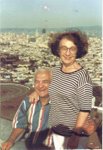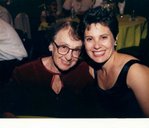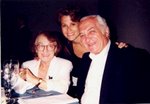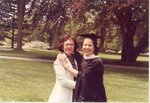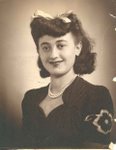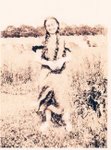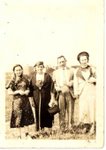Emanuel Sarfaty
Dear Family and Friends:
Today we are here to unveil the plaque placed on Pearl’s grave one year after she passed away. We are here, in an informal manner, without religious oversight, to talk about what Pearl meant to each of us as she departed from our midst.
I will start and then Ruth-Joy will speak, after that anyone else can say or read whatever they want.
Pearl, was a lovely, learned, hard-working woman – wife, mother, grandmother, mother-in-law, social worker and teacher. Note that I always include her occupation
when I talk about her.
When she retired she volunteered to monitor the Nassau County court system and delivered her weekly findings to Judge Kaye, the Administrative Judge in charge. With her understanding about life that came from her ancestral and cultural background – being Jewish and poor in Poland where Jews were openly discriminated against in the school system, etc. - she appreciated the differences between men and women and between people in general; and was able, with her insight, to work for justice and social reform wherever she could.
When she worked in a factory, and she worked in a number of them, she joined the union because she knew it was better for all the workers, including women and black workers who received equal pay for equal work.
Pearl became secretary in her shop’s United Electrical and Machine Worker’s Union after I became its leader. I was elected when our shop chairman was inducted into the armed services and these offices became vacant. Over time this relationship resulted in our becoming boy friend and girl friend, resulting in marriage.
On a personal level, her young adult life was devoted to her family and children – their learning, health and culture. During this period she worked to achieve school integration in the NYC school system, as a PTA Vice Chairperson. But when the stress became too great and the white people in Brooklyn panicked we moved to Hewlett.
She loved America but never accepted its color barriers – she worked against them every way she could – for 25 years she gave sage advice and financial help to the many single mom welfare clients she had when she worked in NYCs social service system. This was a real challenge especially on the nights when there was a fire and families were left homeless.
From the day the United Nations was created she devoted her time, energy and money to seeing that its many activities for children were celebrated and expanded. She supported UNICEF all her life. She understood the importance of the UN in keeping the peace when it was created at the end of WWII.
She took to heart the words from Isaiah – “And they shall beat their swords into plowshares and their spears into pruning hooks. Nation shall not lift up sword against nation, and neither shall they learn war anymore.”
Every winter, when she taught children in elementary school, she took her class to see the Nutcracker Suite at Lincoln Center. For her, this was another way she helped children become better people, by instilling in them the appreciation of good music and the wonders of ballet.
Before I end my remarks with a reading of a couple of poems I want to say a few words about Pearl’s care at the end of her life.
I want to thank Yvonne for giving Pearl the wonderful loving care she deserved. She did it for five long years. I won’t go into all the heartaches and anxiety we had during those years. But through it all, Yvonne made Pearl’s last days the best one could under the circumstances. Since Pearl could not say this herself, I say Thank you again and again to Yvonne.
Now, I will read a couple of poems and that will end my remarks:
The first is a Widower’s Poem of Grief titled “The House is Empty Now” by William Gramley.
The second is a love poem by Elizabeth Barrett Browning titled “How Do I Love Thee”. Pearl brought Ms. Browning’s book of poems with her when we moved to our first apartment.
So, Dear Pearl, someday I too will pass into the night and I will be placed next to you as you lie next to my mother and aunt. Goodbye for now.
The House Is Empty Now
By Reverend William E. Gramley
The house is empty now and so am I
The silence is all around me
and penetrates my every step.
If I listen to music, it pierces my soul
and brings up tears on its way out.
I see her picture on several walls,
giving a momentary glow
to days gone by, filling those rooms
with love's reflections, as I pass through.
I'll go out and return, but the routine and the voices
beyond this place cannot come back with me.
I am stopped and searched at the door,
humbled as I lean upon the entrance way.
I may only take the emptiness in.
That doesn't seem necessary,
since it abides here anyway
The house is empty now
and so am I.
How Do I Love Thee?Ruth-Joy Sarfaty
by Elizabeth Barrett Browning
How do I love thee? Let me count the ways.
I love thee to the depth and breadth and height
My soul can reach, when feeling out of sight
For the ends of being and ideal grace.
I love thee to the level of every day's
Most quiet need, by sun and candle-light.
I love thee freely, as men strive for right.
I love thee purely, as they turn from praise.
I love thee with the passion put to use
In my old griefs, and with my childhood's faith.
I love thee with a love I seemed to lose
With my lost saints. I love thee with the breath,
Smiles, tears, of all my life; and, if God choose,
I shall but love thee better after death.
A Mother's Love
by Helen Steiner Rice
A mother's love is something
that no one can explain,
It is made of deep devotion
and of sacrifice and pain,
It is endless and unselfish
and enduring come what may
For nothing can destroy it
or take that love away...
It is patient and forgiving
when all others are forsaking,
And it never fails or falters
even through the heart is breaking...
It believes beyond believing
when the world around condemns
And it glows with all the beauty
of the rarest, brightest gems...
It is far beyond defining,
it defies all explanation,
And it still remains a secret
like the mysteries of creation...
A many splendoured miracle
We cannot understand
And another wondrous evidence
of a tender guiding hand.
Jeffrey MillerLife
by Charlotte BronteLife, believe, is not a dream,
So dark as sages say;
Oft a little morning rain
Foretells a pleasant day;
Sometimes there are clouds of gloom,
But these are transient all;
If the shower will make the roses bloom,
Oh, why lament its fall?
Rapidly, merrily,
Life's sunny hours flit by,
Gratefully, cheerily,
Enjoy them as they fly.
What thought death at times steps in,
And calls our Best away?
What thought Sorrow seems to win,
O'er hope a heavy sway?
Yet Hope again elastic springs,
Unconquered, though she fell,
Still buoyant are her golden wings,
Still strong to bear us well.
Manfully, fearlessly,
The day of trial bear,
For gloriously, victoriously,
Can courage quell despair!
Evening: The Sun SetMatthew Miller
By Michael Pinder
When the sun goes down, and the clouds all frown,
Night has begun for the sunset.
See it with your eyes, Earth's re-energized,
By the sun's rays everyday.
Take a look out there, planets everywhere.
When the sun goes down, and the clouds all frown,
Night has begun for the sunset.
Shadows on the ground, never make a sound,
Fading away in the sunset.
Night has now become day for everyone.
I can see it all, from this great height,
I can feel the sun, slipping out of sight.
And the world still goes on, through the night.
Free FourHortense Garvey
By Pink Floyd
The memories of a man in his old age
Are the deeds of a man in his prime.
You shuffle in gloom of the sickroom
And talk to yourself as you die.
Life is a short, warm moment
And death is a long cold rest.
You get your chance to try in the twinkling of an eye:
Eighty years, with luck, or even less.
The memories of a man in his old age
Are the deeds of a man in his prime.
You shuffle in gloom in the sickroom
And talk to yourself till you die.
Carrol WilliamsonA Time for Everything
Ecclesiastes 3To every thing there is a season, and a time to every purpose under the heaven:
a time to be born, and a time to die; a time to plant, and a time to pluck up that which is planted;
a time to kill, and a time to heal; a time to break down, and a time to build up;
a time to weep, and a time to laugh; a time to mourn, and a time to dance;
a time to cast away stones, and a time to gather stones together; a time to embrace, and a time to refrain from embracing;a time to get, and a time to lose; a time to keep, and a time to cast away;
a time to rend, and a time to sew; a time to keep silence, and a time to speak;
a time to love, and a time to hate; a time of war, and a time of peace.
What profit hath he that worketh in that wherein he laboreth?
I have seen the travail, which God hath given to the sons of men to be exercised in it.
He hath made every thing beautiful in his time: also he hath set the world in their heart, so that no man can find out the work that God maketh from the beginning to the end.
I know that there is no good in them, but for a man to rejoice, and to do good in his life.
And also that every man should eat and drink, and enjoy the good of all his labor, it is the gift of God.
I know that, whatsoever God doeth, it shall be for ever: nothing can be put to it, nor any thing taken from it: and God doeth it, that men should fear before him.
That which hath been is now; and that which is to be hath already been; and God requireth that which is past.
Carrol Williamson, Yvonne's sister, shared her thoughts about my mother's impact on Yvonne during the time they spent together.
Johari Garvey
How to describe this unexpected moment! Johari sang, and it was perfection. I wished I could have bottled that moment - I know my mother would have loved it, and I wish Hannah had been there to hear it.
It's So Hard to Say Goodbye to Yesterday
By Boys II Men
How do I say goodbye to what we had?
The good times that made us laugh
Outweighed the bad.
I thought we'd get to see forever
But forever's gone away
It's so hard to say goodbye to yesterday
I don't know where this road
Is going to lead.
All I know is where we've been
And what we've been through
If we get to see tomorrow
I hope it's worth the wait
It's so hard to say goodbye to yesterday
And I'll take with me the memories
To be my sunshine after the rain
It's so hard to say goodbye to yesterday
And I'll take with me the memories
To be my sunshine after the rain
It's so hard to say goodbye to yesterday
Yvonne Walker
Finally Yvonne said a few words, through tears, about the importance of the bond that she and my mother shared - the look in my mom's eyes when they'd pray together each day and the connection she still feels to my father and my family as a result of this experience. It was beautiful.
Finally, Jeffrey handed out the stones he had gathered and everyone placed one on the plaque, which says:
Pearl Sarfaty
1922-2007
A Loving Caring Teacher
Finally, here's one last poem for my mother - the teacher - that we did not get a chance to recite:
Teaching
By Kahlil Gibran
Then said a teacher, speak to us
of Teaching.
And he said:
No man can reveal to you aught but
that which
already lies half asleep in the
dawning of your knowledge.
The teacher who walks in the shadow of the
temple, among his followers, gives
not of his wisdom but rather of his faith and
his lovingness.
If he is indeed wise he does not bid
you enter
the house of his wisdom, but rather
leads you to
the threshold of your own mind.
The astronomer may speak to you of his understanding
of space, but he cannot give you his
understanding.
The musician may sing to you of the rhythm which
is in all space, but he cannot give you the ear which
arrests the rhythm nor the voice that echoes it.
And he who is versed in the science
of numbers
can tell of the regions of weight
and measure, but
he cannot conduct your thither.
For the vision of one man lends not
its wings to another man.
And even as each one of you stands alone in
God's knowledge, so must each one
of you be alone
in his knowledge of God and his
understanding of the earth.

